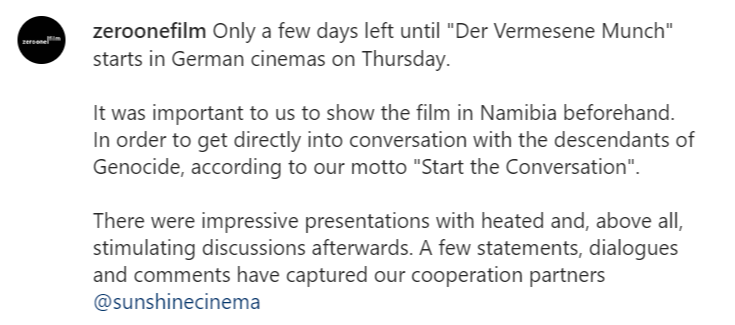Ahead of the German production’s theatrical premiere in Germany this weekend, DER VERMESSENE MENSCH (MEASURES OF MEN) — a feature dramatization of Germany’s colonial crimes in the early 1900s (the Ovaherero Genocide), in what is now Namibia — was screened in Katutura, Okakarara, Otjihenda, Otjinene, and Okahandja communities in Namibia, as well as the local Goethe Institute in Windhoek.
Directed by Lars Kraume, DER VERMESSENE MENSCH’s synopsis reads: Alexander Hoffmann is determined to continue the legacy of his father, a pioneering ethnologist. At university, he gets caught up in the maelstrom of the evolutionist race theory of the late 19th century. Hoffmann is disgusted by the measuring of skulls, which has no other purpose than to pseudo-scientifically legitimize the superiority of the white race – but he goes along with it. He wants to find counter-evidence and seeks contact with Kezia Kambazemi, the interpreter of a delegation of Nama and Herero in Berlin who have been forced to take part in a “peoples show”. Shortly after the delegation leaves, an uprising against the German colonial power begins in what was then “German Southwest Africa”. As an ethnologist, Hoffmann becomes a member of an expedition and travels all over the country under the protection of the imperial army in search of skulls – and of Kezia.
Attending the Namibia screenings, which took place in early March, following the film’s Berlinale premiere in February, were representatives from the production company, Berlin-based Zero One Film, and the film’s two leads, German actor Leonard Scheicher, and Namibian actress Girley Charlene Jazama.
The producers wanted to “start a conversation,” as they said on their Instagram page, beginning where the genocide (1904-1908) happened, with the descendants of the victims. And start a conversation they apparently did, sharing footage from discussions that followed.

The first clip features Esther Muinjangue, Namibia’s Deputy Health Minister, the first woman to lead a political party in Namibia, and the country’s first female presidential candidate. In the clip, she makes concrete demands of the German government.
And in the second clip, a Namibian man of German ancestry calls on the Germans to finally act on the matter of fair land distribution. German colonizers invaded Namibia in the late 1800s (see the Scramble for Africa) and remained in the country after it became a mandate of South Africa in 1915. And long after Namibia became independent in 1990 after a difficult, lengthy liberation struggle, German Namibians make up around 5% of the population. Today, German nationals own far more land in Namibia than foreigners from any other country.
And when asked by an audience member in Katutura, the lead actress Girley Charlene Jazama, shared what the film means to her.
In this clip, an elder speaks to the utilization of cinema (and the conversations inspired by it) as a necessary tool to educate youth and future generations, ensuring that this history is kept alive.
The producers say that the film will be shown at “numerous special events and school screenings” throughout Germany, followed by conversations with director Lars Kraume, lead actress Girley Charlene Jazama, and scholars on the history.
International distribution plans for DER VERMESSENE MENSCH (MEASURES OF MEN) aren’t public at this time. It’s likely to travel the film festival circuit as it, as its sales company, Picture Tree Intl., presents the film to distributors at markets like the upcoming Marché du Film at Cannes in May.
Here’s a first look trailer:
